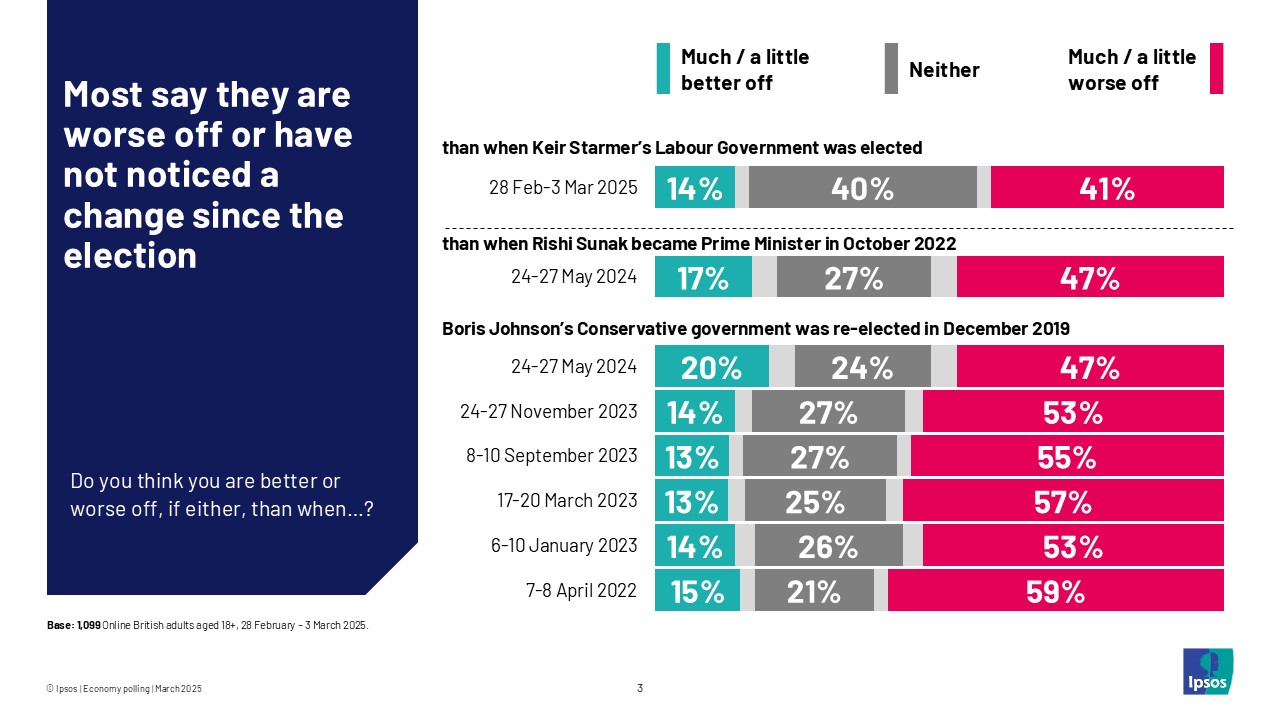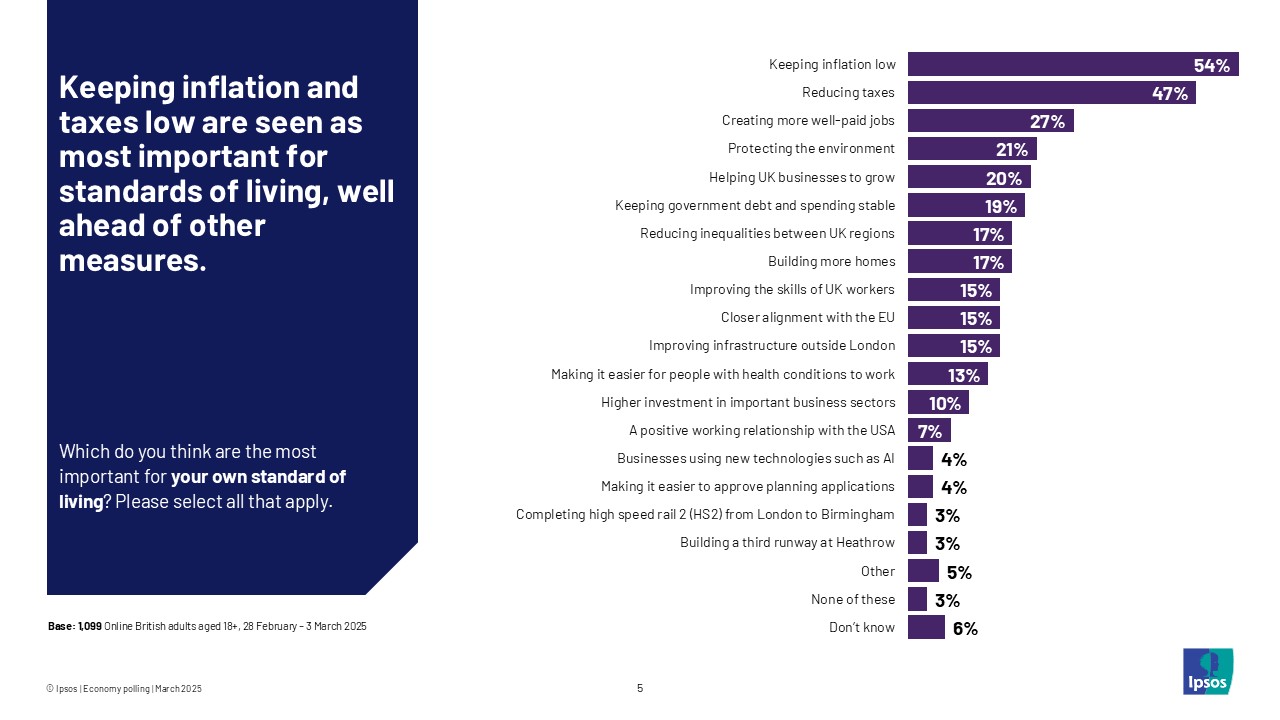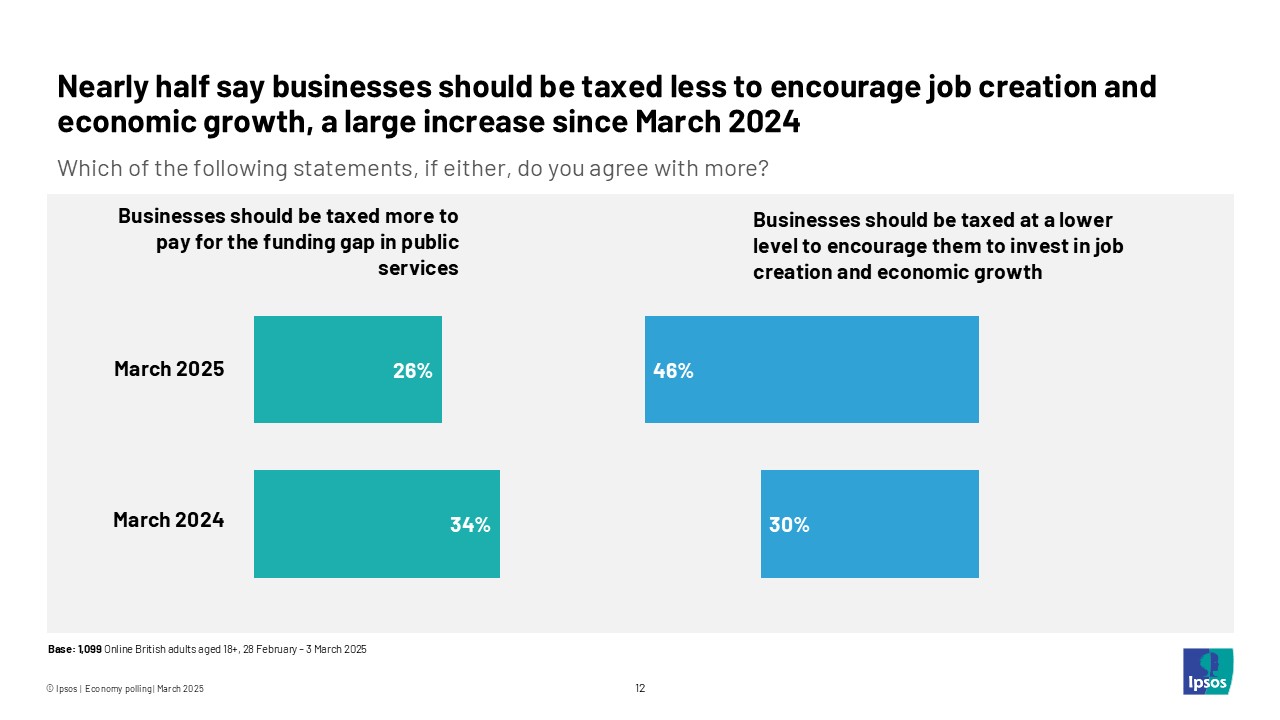Just one in seven say they feel better off since Labour came to power
A new Ipsos UK poll reveals that just one in seven (14%) of Britons say they feel better off since Labour came to power in July 2024. The poll, conducted in March 2025 just ahead of the Chancellor’s upcoming Spring Statement, surveyed over 1,000 British adults and suggests that Britons – including Labour voters – continue to struggle with the cost of living.
Personal finances
- Cost of living still bites: Around a quarter (24%) of people report living comfortably, a 6 ppt decrease compared to the previous year, while nearly half describe themselves as ‘coping’ (48%, +5 since last May). A quarter, 27%, say they are finding it difficult (including 9% finding it very difficult), little changed since last year.
- Change in government not leading to increased optimism: Around four in ten (41%) say they are worse off since Labour came to power in July 2024, while a similar proportion (40%) say they have not noticed a change. This is not quite as negative as under the previous Conservative government but does not suggest an increase in those feeling that things are getting better either.
- Challenges among Labour voters: 23% of 2024 Labour voters say they feel worse off, with a similar proportion (22%) saying they feel better off. Over half (53%) say they have not noticed a change.

- Inflation and taxes top concerns: The public prioritise keeping inflation low (54%), reducing taxes (45%), and helping UK businesses to grow (40%) as the most important factors for growing the economy. Similarly, when asked about what factors are most important for their own standard of living, Britons also prioritise keeping inflation low (54%), and reducing taxes (47%), with creating more well-paid jobs in third place (27%).

- National insurance increase raises concerns: The public expresses significant concern over the upcoming rise in employer National Insurance contributions, with 46% expecting it to lead to higher prices, and 41% to lead to lower wages for workers.
The public's policy preferences
Elsewhere in the poll, people were asked to answer a series of either/or questions about economic policy preferences.
- Support for reducing taxes on businesses up significantly from 2024: Almost half (46%) believe that businesses should be taxed at a lower level to encourage them to invest in job creation and economic growth, up from three in ten (30%) last year before the election.
- This goes with growing concern over red tape, although this is still more support for stricter rules on businesses and environmental protection: 43% believe the government should set stricter rules for businesses on issues like workers’ rights and environmental standards, compared with 34% who prioritise cutting red tape to create jobs (but support for cutting red tape is up 10 ppts since last year).

- Path to growth splits public: Opinions are split on the importance of economic growth, with the public slightly more likely to believe that politicians focus too much on growth at the expense of other issues (38%) versus not focusing enough on economic growth (32%). Similarly Britons are split on the overall impact of globalisation.
- One third (33%) think that redistribution of money is more important than economic growth, compared to 38% who prioritise growth, representing a slight shift towards growth in the last few years.
- 37% believe protecting the environment should be prioritised, even if it potentially hinders economic growth, while 32% put growth first - although those prioritising the environment are down from 43% in 2022. Britons are more concerned over protecting the natural environment, with 47% giving this priority even if it means building less housing and infrastructure.
- Britons continue to feel that controlling immigration is a bigger priority rather than allowing as much immigration as needed to support growth, by a margin of 48% to 32%,
- On trade, the public thinks it is more important to build a close relationship with the EU rather than the US, by 42% to 22%.
Commenting on the findings, Gideon Skinner, Senior Director of UK Politics at Ipsos, said:
For many Britons, the cost of living squeeze continues. In fact, just one in seven feel better off since Labour came to power last July. The challenge for Keir Starmer and Rachel Reeves is that so far the public are worrying more about the potential negative impacts of their policies rather than the longer-term benefits that they hope will result – even their own supporters don’t feel much better off since they voted for them. Ahead of the Spring Statement, the Chancellor will have a difficult balancing act. Reports suggest she needs to make further cuts to public expenditure, and there is little public appetite for more tax rises. Britons also want to hear how the government will be supporting business to help deliver growth. Many voters continue to face real economic difficulties, but at the same time aren’t seeing the improvements in public services that they want either. The risk for the government is how much patience voters will have for Labour’s policy agenda to deliver.
Technical note:
- Ipsos interviewed a representative sample of 1,099 adults aged 18+ across Great Britain. Polling was conducted online between the 28th February-3rd March 2025.
- Data are weighted to match the profile of the population. All polls are subject to a wide range of potential sources of error.




